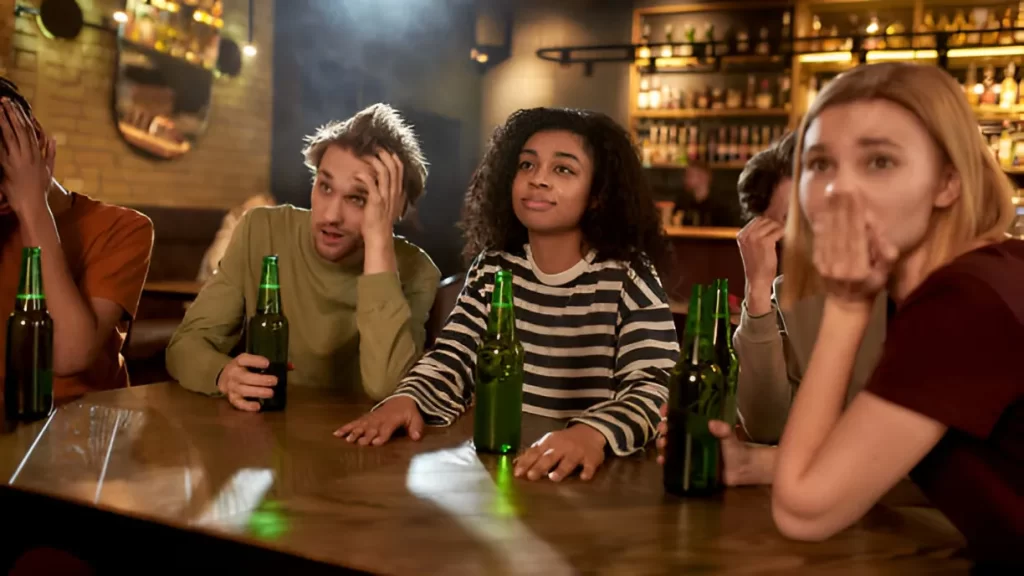Table of Contents
Have you ever found yourself completely puzzled by someone’s behavior when they’re drinking? One moment they’re sending clear signals, the next they’re acting totally different.
Can sober people feel confused around a drunk girl? Absolutely – and you’re not alone in this experience.
This confusion happens more often than you might think. When alcohol enters the picture, it changes how people communicate, act, and express themselves.
For someone sober, these mixed signals can feel overwhelming and hard to understand.
In this guide, we’ll explore why this confusion happens, what’s going on psychologically, and most importantly, how to handle these tricky situations with confidence and respect.
Why Do Sober People Feel Confused Around Drunk Individuals?

The Science Behind Alcohol and Behavior Changes
Alcohol acts as what scientists call a “disinhibitor.” This fancy word simply means it reduces the brain’s ability to control impulses and filter thoughts. When someone drinks, several things happen:
Physical Changes:
- Slower reaction times
- Reduced coordination
- Slurred speech
- Changes in facial expressions
Mental Changes:
- Lower inhibitions
- Reduced decision-making ability
- Emotional intensity increases
- Memory formation becomes impaired
Social Changes:
- More outgoing behavior
- Increased confidence
- Different personality traits emerge
- Boundary awareness decreases
These changes create a version of the person that might be very different from who they are when sober. No wonder it’s confusing!
The Sober Person’s Perspective
When you’re sober and interacting with someone who’s been drinking, your brain is working at full capacity. You’re:
- Reading social cues clearly
- Making rational decisions
- Remembering everything that happens
- Maintaining your normal personality
This creates what psychologists call “cognitive dissonance” – when two different realities don’t match up. Your sober brain tries to make sense of behavior that doesn’t follow normal social patterns.
Read also: How Recuperbate Accelerates Recovery, Boosts Performance, and Reduces Stress
Common Scenarios That Create the Most Confusion
Party and Social Situations
The Weekend Party Dynamic
Picture this: You’re at a party, staying sober while others are drinking. A girl you know acts very friendly and flirty with you all night. She’s laughing at your jokes, touching your arm, and seems really interested in talking to you.
But then Monday comes around, and she barely acknowledges you at work or school. What happened?
This is one of the most common scenarios where sober people feel confused around drunk girls. The alcohol created a temporary personality that doesn’t match her sober self.
Bar and Club Confusion
In bars and clubs, alcohol flows freely, and social rules seem different. Someone might:
- Dance very close to you while drinking
- Share personal stories they normally wouldn’t
- Act much more outgoing than usual
- Seems romantically interested
When you see them sober later, they might act like nothing happened or seem embarrassed about their behavior.
Mixed Romantic Signals
The “Liquid Courage” Effect
Alcohol often gives people the courage to express feelings they normally keep hidden. But here’s the tricky part – are these feelings real, or just the alcohol talking?
Signs of Alcohol-Influenced Attraction:
- Only shows interest when drinking
- Can’t remember conversations from the night before
- Acts completely differently when sober
- Avoids talking about drunk interactions
Signs of Genuine Interest:
- Consistent behavior across sober and drinking situations
- Remembers conversations and follows up
- Expresses similar feelings when sober
- Comfortable discussing what happened
Friendship Boundary Changes
Sometimes the confusion isn’t romantic – it’s about friendship boundaries. A friend might:
- Share very personal information while drunk
- Acted much more emotionally than usual
- Become overly clingy or affectionate
- Say things that seem out of character
When they’re sober again, they might not remember or might feel embarrassed about their openness.
The Psychology Behind the Confusion
How Gender Dynamics Play a Role
Social expectations around gender can make these situations even more confusing. Society often teaches us different rules for how men and women should behave, especially around alcohol and social interactions.
Common Misconceptions:
- “If she’s flirty while drunk, she must be interested.”
- “Alcohol reveals true feelings.”
- “She’s just being friendly because she’s drunk.”
The truth is more complex. Alcohol affects everyone differently, and drunk behavior isn’t necessarily a reflection of sober thoughts or feelings.
Communication Breakdown Factors
When someone is drinking, several communication problems can occur:
Verbal Communication Issues:
- Words might not match the intended meaning
- Emotional tone can be misleading
- Important details get forgotten
- Conversations lack normal filters
Non-Verbal Confusion:
- Body language becomes exaggerated
- Personal space boundaries change
- Eye contact patterns shift
- Facial expressions become harder to read
Emotional Regulation Problems:
- Feelings become more intense
- Mood swings happen quickly
- Reactions seem disproportionate
- Emotional responses lack normal control
Practical Strategies for Managing the Confusion
Setting Healthy Boundaries
Protect Your Mental Health
The first step in dealing with confusing drunk behavior is protecting yourself emotionally. Here’s how:
Don’t Take It Personally: Remember that drunk behavior often has little to do with you and everything to do with alcohol’s effects on the brain.
Set Clear Limits:
- Decide what interactions you’re comfortable with
- Don’t engage in serious conversations with drunk individuals
- Avoid making important decisions based on drunk behavior
- Keep your own boundaries firm
Practice Emotional Detachment: Try to observe the situation objectively rather than getting emotionally invested in mixed signals.
Effective Communication Techniques
How to Talk to Someone Who’s Been Drinking
Keep It Simple:
- Use clear, direct language
- Avoid complex topics
- Repeat important information
- Don’t assume they’ll remember everything
Stay Calm and Patient:
- Don’t argue with drunk logic
- Avoid getting frustrated by repeated questions
- Keep your tone neutral and friendly
- Remember, they’re not thinking clearly
Save Important Conversations: If something important comes up while someone is drinking, write it down and bring it up when they’re sober. This includes:
- Relationship discussions
- Plans
- Personal problems
- Serious decisions
Managing Your Own Emotions
Process Confusing Interactions
After a confusing interaction with someone who’s been drinking:
- Give Yourself Time: Don’t try to figure everything out immediately. Sleep on it and revisit your feelings when you’ve had time to process.
- Talk to Trusted Friends: Share your experience with friends who can offer perspective. Sometimes an outside view helps clarify confusing situations.
- Journal Your Thoughts: Writing down what happened and how you felt can help you identify patterns and understand your reactions better.
- Focus on Facts: Separate what actually happened from your interpretation of events. This helps you see situations more clearly.
When to Be Concerned: Red Flags and Safety
Recognizing Dangerous Situations
While feeling confused is normal, some situations require immediate attention:
Signs of Dangerous Intoxication:
- Vomiting or inability to stand
- Confusion about basic information (name, location)
- Difficulty breathing
- Unconsciousness or inability to wake up
- Aggressive or violent behavior
Safety Red Flags:
- Someone is trying to take advantage of intoxication
- Pressure to drink or participate in activities
- Unsafe transportation situations
- Threatening or concerning behavior
When Social Confusion Indicates Deeper Problems: If someone’s drinking consistently creates confusion and chaos in relationships, it might indicate:
- Alcohol dependency issues
- Mental health concerns
- Need for professional support
- Unhealthy relationship patterns
Seeking Help and Support
For Yourself: If you find yourself constantly confused by drunk behavior, consider:
- Talking to a counselor about relationship patterns
- Joining support groups for friends/family of drinkers
- Learning more about alcohol’s effects on behavior
- Setting stronger personal boundaries
For Others: If you’re concerned about someone’s drinking:
- Research local treatment resources
- Learn about intervention strategies
- Connect with professional counselors
- Avoid enabling unhealthy behavior
Building Healthy Relationships Across Different Sobriety States
Creating Consistent Connections
Establish Clear Ground Rules
For healthy relationships with people who drink, consider establishing:
Communication Rules:
- “Let’s have important conversations when we’re both sober.”
- “I’ll check in with you the next day about the plans we made.”
- “We both respect each other’s choices about drinking.”
Boundary Agreements:
- What behavior is acceptable in different settings
- How to handle social situations with mixed sobriety levels
- Respecting each other’s comfort zones
- Plans for handling awkward situations
Consistency Expectations:
- Being honest about mixed signals
- Following through on sober commitments
- Addressing confusing behavior when sober
- Maintaining respect regardless of drinking status
Respecting Different Lifestyle Choices
Understanding Different Perspectives
People have various relationships with alcohol:
- Some people drink socially without problems
- Others choose sobriety for personal reasons
- Some struggle with alcohol dependency
- Many fall somewhere in between
The key is respecting these differences while maintaining your boundaries and values.
People also ask
Is drunk behavior a person’s “true self”?
No, alcohol changes brain function and doesn’t reveal someone’s true personality. Drunk behavior is influenced by chemical changes, not hidden truths.
Should I believe what someone says when they’re drunk?
Take drunk statements with caution. People often say things they don’t mean or can’t properly think through when intoxicated.
How do I know if someone’s romantic interest is real or just alcohol talking?
Look for consistency. Real interest will show up in sober interactions, while alcohol-only interest disappears when the effects wear off.
Is it okay to feel frustrated by mixed signals from drunk people?
Absolutely. Feeling confused and frustrated is a normal response to inconsistent behavior. The key is not taking it personally.
Should I avoid people who act differently when drinking?
This depends on your comfort level and the severity of the behavior changes. You have every right to protect your emotional well-being.
Final Words
Can sober people feel confused around a drunk girl? The answer is definitely yes – and it’s completely understandable.
Alcohol creates significant changes in behavior, communication, and personality that can leave sober individuals feeling puzzled and frustrated.
The key to handling these situations is understanding that drunk behavior often doesn’t reflect someone’s true thoughts or feelings. Instead of trying to decode mixed signals, focus on:
- Protecting your emotional well-being
- Setting clear boundaries
- Having important conversations when everyone is sober
- Not taking alcohol-influenced behavior personally
Remember, you deserve clear, consistent communication in your relationships. Don’t settle for confusion and mixed signals just because alcohol is involved.
By understanding the psychology behind these interactions and implementing healthy boundaries, you can navigate social situations with confidence while maintaining your emotional well-being.






